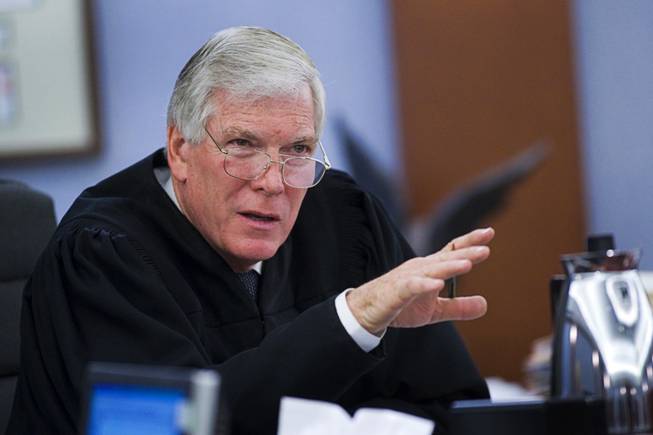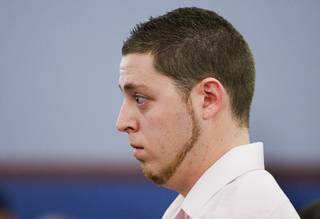
Judge Donald Mosley asks a question to attorneys during a bail hearing for Leonard Schwingdorf in District Court Wednesday, Sept. 28, 2011. Schwingdorf is among defendants facing charges in connection with distributing medical marijuana.
Wednesday, Sept. 28, 2011 | 4:01 p.m.
Judge OKs Las Vegas medical pot case, says laws aren't too vague
A state court judge rejected a challenge of the state's medical marijuana law Tuesday.
Sun Coverage
- Judge OKs Las Vegas medical pot case, says laws aren’t too vague (9-27-2011)
- Judge to rule soon on Las Vegas medical marijuana co-op case (9-16-2011)
- Attorney: Marijuana dispensary case should go to Supreme Court (6-22-2011)
- Case shines light on medical marijuana law as 6 plead not guilty (6-22-2011)
- 6 arrested in raid on alleged marijuana dispensary (11-23-2010)
- 12 arrested with ties to Las Vegas medical marijuana clinic raids (1-6-2011)
Like a wild weed that is chopped down but keeps popping back up, a marijuana dispensary case that a Clark County judge dismissed earlier this month was back before the same judge today in district court.
Leonard Schwingdorf pleaded not guilty today to 10 charges involving the sale of marijuana at the Sin City Co-op, a medical marijuana dispensary that was raided by state authorities in July as a drug-trafficking organization.
Schwingdorf, 23, is among several people who have been indicted as a result of law enforcement crackdowns on co-ops that have been formed to provide medicinal marijuana for those who have medical cards that say they can possess it. The co-ops were set up as a way to deal with the state law, which allows those who need pot for medicinal purposes to possess it and grow their own small amounts, but does not provide a way for them to legally obtain it otherwise.
The co-op organizers say they were set up to accept donations to provide members with marijuana. Prosecutors and law enforcement officers say the donation is really a sale, which is against state law.
“We argue that it is not sale. And we argue that he didn’t even know that he was doing anything illegal. That’s the crux of our argument, that the law is unclear, John Million Turco, Schwingdorf’s attorney, told the judge today.
On Sept. 12, Mosley threw out Schwingdorf’s earlier case for procedural reasons, citing mistakes prosecutors made in getting the grand jury indictment against Schwingdorf and his co-owner, Nathan Hamilton. At that time, Mosley also said he couldn’t make any sense of the Nevada’s pot laws — and said, according to a Las Vegas Review-Journal report — that the Legislature should decide whether medicinal marijuana is legal or not.
Two days later, on Sept. 15, the Clark County district attorney’s office took the case back to a grand jury and Schwingdorf and Hamilton were re-indicted on multiple charges of marijuana possession, sales and trafficking. At the time of the second indictment, bail was set at $300,000 for Hamilton and $100,000 for Schwingdorf.
At today’s arraignment, Mosley reduced Schwingdorf’s bail to $100. Outside the courtroom, Turco said that was the smallest bail he had seen Mosley grant. A status check on the bail is at 9 a.m. Oct. 5.
Schwingdorf’s co-defendant, Hamilton, is incarcerated in California on an unrelated misdemeanor and could not attend today’s hearing, according to his attorney, Robert Draskovitch. However, Mosley allowed Draskovitch to enter a plea of not guilty on Hamilton’s behalf.
The judge set the trial for the two defendants for 1:30 p.m. May 7.
Meanwhile, both Draskovitch and Turco filed motions later today that the state law is vague and the cases against their clients should be thrown out. Because of Mosley’s earlier statement on Sept. 12, they think he will dismiss the case.
“The law is no good because it’s so unclear,” Turco said.
Draskovitch also represents one of six defendants in a different marijuana dispensary case, involving Jolly Green Meds, before District Judge Doug Smith. Earlier this week, Smith rejected a similar motion that the case be dismissed, saying the state’s medical marijuana laws aren’t too vague.
“We have two judges, both district court judges with equal power. They have the same facts, the same law, and they have come to different conclusions,” Turco said. “One way or another it’s going to end up in front of the Supreme Court, because it is so unclear. “


Join the Discussion:
Check this out for a full explanation of our conversion to the LiveFyre commenting system and instructions on how to sign up for an account.
Full comments policy